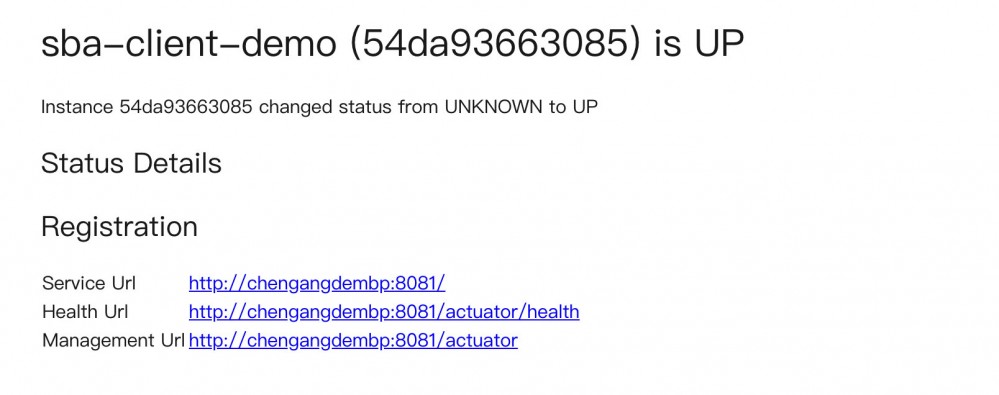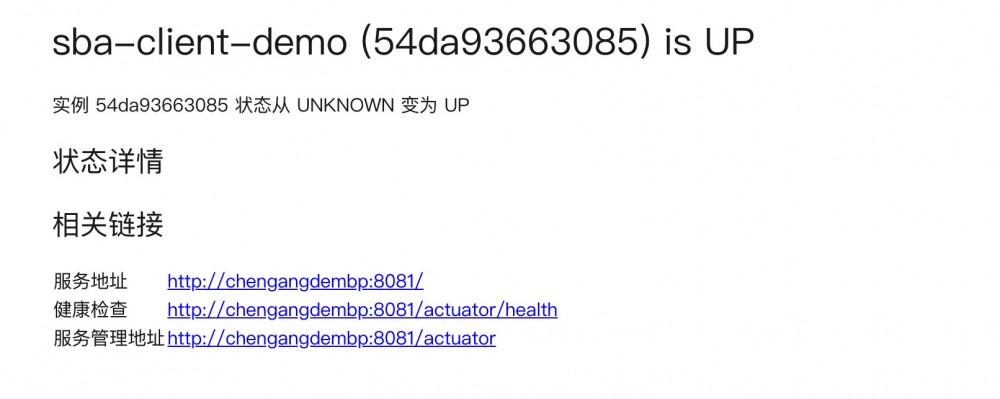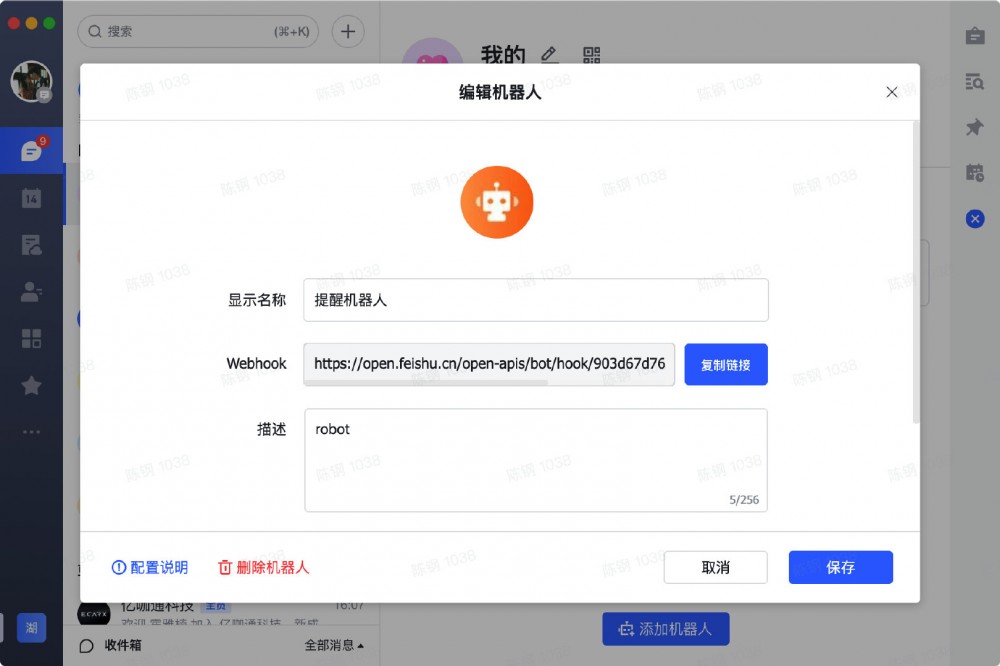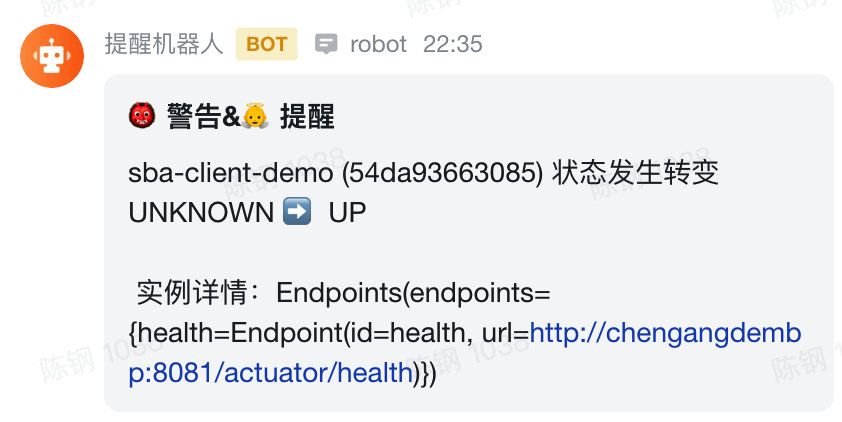Spring Boot Admin实现服务健康预警
内容纲要
Over View
上一篇文章主要介绍了Spring Boot Admin的概况以及我们如何在系统中引入和使用Spring Boot Admin,以此来帮助我们更加了解自己的系统,做到能快速发现、排查问题。本篇文章将用代码演示Spring Boot Admin的消息通知功能,并利用这个开箱即用的特性来个性化我们的需求,优化我们在服务治理方面的工作效率。
Spring Boot Admin内置了多种开箱即用的系统通知渠道,包括邮件、Slack、Telegram、Hipchat等多种社交媒体的通知渠道。但是考虑到它所支持的大都是一些国外的主流社交媒体,在国内的本地化可能并不是那么的友好。不过没关系Spring Boot Admin也提供了通用的接口,使得用户可以基于他所提供的接口来自定义通知方式。下面使用Spring Boot Admin的通知功能来实现基于邮件和国内办公软件“飞书”的服务健康预警。
邮件预警
依赖引入
在Spring Boot Admin的服务端项目中引入邮件相关依赖
<dependency>
<groupId>org.springframework.boot</groupId>
<artifactId>spring-boot-starter-mail</artifactId>
</dependency>
添加配置
添加Spring Mail相关配置,我们配置好我们邮箱的Smtp服务器相关信息
spring.mail.host=your email smtp server spring.mail.password=your password spring.mail.port=your email smtp server port spring.mail.test-connection=true spring.mail.username=837718548@qq.com
添加Spring Boot Admin(SBA)中相关的邮件配置,以下是SBA官方提供的邮件相关参数
| Property name | Description | Default value |
|---|---|---|
| spring.boot.admin.notify.mail.enabled | Enable mail notifications | true |
| spring.boot.admin.notify.mail.ignore-changes | Comma-delimited list of status changes to be ignored. Format: "
|
"UNKNOWN:UP" |
| spring.boot.admin.notify.mail.template | Resource path to the Thymeleaf template used for rendering. | "classpath:/META-INF/spring-boot-admin-server/mail/status-changed.html" |
| spring.boot.admin.notify.mail.to | Comma-delimited list of mail recipients | "root@localhost" |
| spring.boot.admin.notify.mail.cc | Comma-delimited list of carbon-copy recipients | |
| spring.boot.admin.notify.mail.from | Mail sender | "Spring Boot Admin noreply@localhost " |
| spring.boot.admin.notify.mail.additional-properties | Additional properties which can be accessed from the template |
我们这里使用如下配置
spring.boot.admin.notify.mail.from=837718548@qq.com spring.boot.admin.notify.mail.ignore-changes="" spring.boot.admin.notify.mail.to=目标邮箱
配置中的ignore-changes参数表示服务从一个状态变成其他状态时发出预警,例如:"UNKNOWN:UP" 表示服务从未知状态变成UP时,发出通知。当其值是""时,表示任何状态变更都会发出预警。若想指定其他参数,参考上面的参数表。
完成上述操作后,重启Spring Boot Admin服务端,当客户端服务注册进来并且状态变为UP时,我们可以收到一封邮件:

添加邮件模版
Spring Boot admin发送的邮件可以自定义模板样式,我们使用thymeleaf语法编写邮件模板,示例模板代码可参考本文在Github的 代码示例仓库 ,编写完模板文件之后,将文件放入项目src/main/resources/templates中,并且在配置文件中增加指定模板文件的地址:
spring.boot.admin.notify.mail.template=classpath:/templates/status-changed.html
重启Spring Boot Admin服务端,当客户端服务注册进来并且状态变为UP时,我们可以收到一封邮件,如下是我们对邮件进行本地化之后的样式:

飞书预警
由于Spring Boot Admin内置的通知渠道都是国外的社交媒体,不过它也提供了自定义通知渠道的接口,所以我们很容易就可以自定义通知渠道,下面演示集成办公软件飞书的通知。
获取通知地址
飞书中提供了聊天机器人,我们只需调用机器人的WebHook就可以实现详细的推送(企业微信,钉钉也具有类似功能)。

自定义通知渠道
Spring Boot Admin中提供了一个AbstractStatusChangeNotifier抽象类,我们可以通过继承它来自定义通知渠道
public class FlyBookNotifier extends AbstractStatusChangeNotifier {
private static final String DEFAULT_MESSAGE = "#{instance.registration.name} (#{instance.id}) 状态发生转变 #{lastStatus} :arrow_right: #{instance.statusInfo.status} " +
"/n" +
"/n 实例详情:#{instanceEndpoint}";
private final SpelExpressionParser parser = new SpelExpressionParser();
private RestTemplate restTemplate;
private URI webhookUrl;
private Expression message;
public FlyBookNotifier(InstanceRepository repository, RestTemplate restTemplate) {
super(repository);
this.restTemplate = restTemplate;
this.message = parser.parseExpression(DEFAULT_MESSAGE, ParserContext.TEMPLATE_EXPRESSION);
}
@Override
protected Mono<Void> doNotify( InstanceEvent event, Instance instance) {
if (webhookUrl == null) {
return Mono.error(new IllegalStateException("'webhookUrl' must not be null."));
}
return Mono
.fromRunnable(() -> restTemplate.postForEntity(webhookUrl, createMessage(event, instance), Void.class));
}
public void setRestTemplate(RestTemplate restTemplate) {
this.restTemplate = restTemplate;
}
protected Object createMessage(InstanceEvent event, Instance instance) {
Map<String, Object> messageJson = new HashMap<>();
messageJson.put("title", ":japanese_ogre:警告&:angel:提醒");
messageJson.put("text", getText(event, instance));
HttpHeaders headers = new HttpHeaders();
headers.setContentType(MediaType.APPLICATION_JSON);
return new HttpEntity<>(messageJson, headers);
}
protected String getText(InstanceEvent event, Instance instance) {
Map<String, Object> root = new HashMap<>();
root.put("event", event);
root.put("instance", instance);
root.put("instanceEndpoint", instance.getEndpoints().toString());
root.put("lastStatus", getLastStatus(event.getInstance()));
StandardEvaluationContext context = new StandardEvaluationContext(root);
context.addPropertyAccessor(new MapAccessor());
return message.getValue(context, String.class);
}
public URI getWebhookUrl() {
return webhookUrl;
}
public void setWebhookUrl(URI webhookUrl) {
this.webhookUrl = webhookUrl;
}
public String getMessage() {
return message.getExpressionString();
}
public void setMessage(String message) {
this.message = parser.parseExpression(message, ParserContext.TEMPLATE_EXPRESSION);
}
}
上面代码是一个示例,用户可以根据自己的需求来自定义消息体的格式和内容。
随后我们在Spring中创建该通知类的bean
@Configuration
public static class NotifierConfiguration {
@Bean
@ConditionalOnMissingBean
@ConfigurationProperties("spring.boot.admin.notify.flybook")
public FlyBookNotifier flyBookNotifier(InstanceRepository repository) {
return new FlyBookNotifier(repository, new RestTemplate());
}
}
最后我们在项目的配置文件中添加我们飞书渠道的配置信息
spring.boot.admin.notify.flybook.ignore-changes="" spring.boot.admin.notify.flybook.webhook-url=https://open.feishu.cn/open-apis/bot/hook...
完成上述操作后,重启Spring Boot Admin服务端,当客户端服务注册进来并且状态变为UP时,我们可以在飞书端收到Spring Boot Admin自动推过来的预警信息:

至此,我们的自定义消息渠道就已经完成。通过继承AbstractStatusChangeNotifier抽象类,我们可以很轻易的自定义自己想要实现的推送渠道( 设计模式:模板方法模式 )。
总结
本文主要介绍了Spring Boot Admin中所提供的多种消息预警推送渠道,并且我们可以通过自定义消息预警渠道来满足我们自身的需求,整个过程并不需要耗费太多的人力和时间成本。我们用了两个示例来演示如何实现Spring Boot Admin的消息预警功能,分别是邮件预警和自定义的飞书预警。
本文的示例代码
SBA-client: https://github.com/cg837718548/sba-client-demo.git
SBA-server: https://github.com/cg837718548/sba-server-demo.git
关注笔者公众号,推送各类原创/优质技术文章 :arrow_down:

- 本文标签: js IDE HTML 参数 http bean 服务注册 root https UI App REST entity Property Lua web git 配置 设计模式 软件 src 钉钉 Spring Boot spring ip map 时间 list client 邮件模板 id mail cat 需求 value Connection Wildcards 服务端 tab description 代码 json 企业 message IO classpath tar GitHub 实例 总结 文章 聊天机器人 服务器 API parse final Word ORM HashMap
- 版权声明: 本文为互联网转载文章,出处已在文章中说明(部分除外)。如果侵权,请联系本站长删除,谢谢。
- 本文海报: 生成海报一 生成海报二











![[HBLOG]公众号](https://www.liuhaihua.cn/img/qrcode_gzh.jpg)

